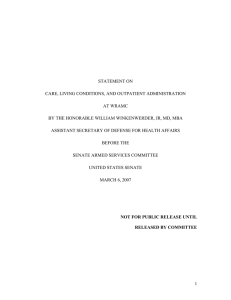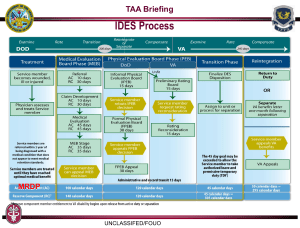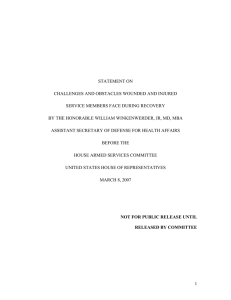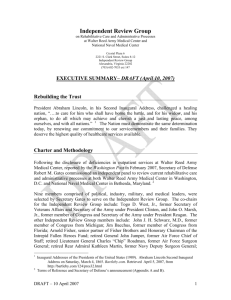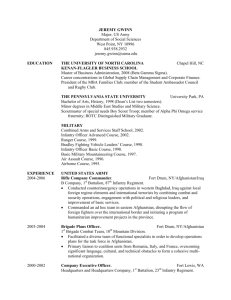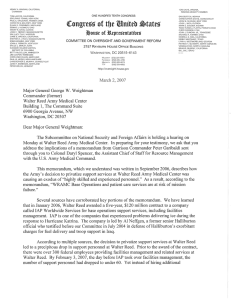Prepared Remarks of SSG John Daniel Shannon U.S. House of Representatives
advertisement
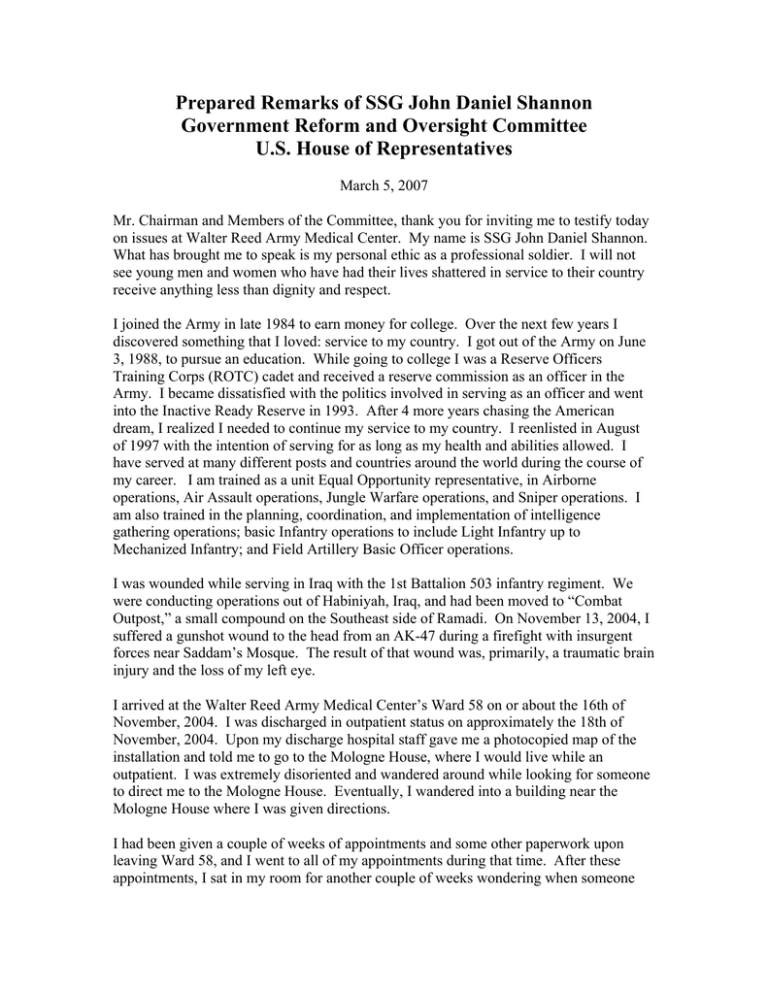
Prepared Remarks of SSG John Daniel Shannon Government Reform and Oversight Committee U.S. House of Representatives March 5, 2007 Mr. Chairman and Members of the Committee, thank you for inviting me to testify today on issues at Walter Reed Army Medical Center. My name is SSG John Daniel Shannon. What has brought me to speak is my personal ethic as a professional soldier. I will not see young men and women who have had their lives shattered in service to their country receive anything less than dignity and respect. I joined the Army in late 1984 to earn money for college. Over the next few years I discovered something that I loved: service to my country. I got out of the Army on June 3, 1988, to pursue an education. While going to college I was a Reserve Officers Training Corps (ROTC) cadet and received a reserve commission as an officer in the Army. I became dissatisfied with the politics involved in serving as an officer and went into the Inactive Ready Reserve in 1993. After 4 more years chasing the American dream, I realized I needed to continue my service to my country. I reenlisted in August of 1997 with the intention of serving for as long as my health and abilities allowed. I have served at many different posts and countries around the world during the course of my career. I am trained as a unit Equal Opportunity representative, in Airborne operations, Air Assault operations, Jungle Warfare operations, and Sniper operations. I am also trained in the planning, coordination, and implementation of intelligence gathering operations; basic Infantry operations to include Light Infantry up to Mechanized Infantry; and Field Artillery Basic Officer operations. I was wounded while serving in Iraq with the 1st Battalion 503 infantry regiment. We were conducting operations out of Habiniyah, Iraq, and had been moved to “Combat Outpost,” a small compound on the Southeast side of Ramadi. On November 13, 2004, I suffered a gunshot wound to the head from an AK-47 during a firefight with insurgent forces near Saddam’s Mosque. The result of that wound was, primarily, a traumatic brain injury and the loss of my left eye. I arrived at the Walter Reed Army Medical Center’s Ward 58 on or about the 16th of November, 2004. I was discharged in outpatient status on approximately the 18th of November, 2004. Upon my discharge hospital staff gave me a photocopied map of the installation and told me to go to the Mologne House, where I would live while an outpatient. I was extremely disoriented and wandered around while looking for someone to direct me to the Mologne House. Eventually, I wandered into a building near the Mologne House where I was given directions. I had been given a couple of weeks of appointments and some other paperwork upon leaving Ward 58, and I went to all of my appointments during that time. After these appointments, I sat in my room for another couple of weeks wondering when someone would contact me about continuing my medical care. Finally, I went through the paperwork I was given and started calling all the phone numbers until I reached my case manager, who promptly got me the appointments I needed. She was somewhat distressed because she hadn’t been able to locate me since I had been released to outpatient status, even though the record indicated I had been making all of my appointments in the first two weeks since being discharged from Ward 58. I soon made contact with the Medical Holding Company. At that time I was in-processed and assigned to the 2nd Platoon, Medical Holding Company. I was informed that the process for my medical retirement would not proceed until my face was put back together. This process (Medical Evaluation Board and Physical Evaluation Board [MEB/PEB]) is central to determining what benefits we receive for our injuries, i.e., whether we are classified as Return to Duty, Medical Discharge, or Medical Retirement status. I then went through periodic evaluations to determine what type of plastic surgery was going to be successful in preparing my face for receiving a prosthetic eye. Due to the nature of my injuries I was reevaluated every 3 months. During this evaluation, Post Traumatic Stress Disorder (PTSD) symptoms started surfacing. I was informed that my MEB/PEB would not proceed until the PTSD was medicinally controlled. Months later, I was informed that my MEB had to be restarted because my information had been lost. I believe I was contacted by my physical evaluation counselor, Mr. Michael Thornton, informing me that we had to restart my retirement process because my paper work had been lost. This was another significant blow to my trust in that process—a process which seems designed specifically to reduce the government's cost of veteran care. On the morning of January 1, 2005, I was questioned in my room by Army Criminal Investigation Division. They were investigating the death of a soldier a few doors down from me. At the time, it appeared to be a suicide. This lead to my efforts to work on better accountability for service members at Walter Reed. The Medical Holding Company at that time was responsible for 900 or more patients. Platoons consisted of 100 to 200 or more personnel with one Platoon Sergeant working on accountability of those personnel every day. The company commander, Major Middleton, had an XO and, I believe, less than 15 staff members at that time. As a result of my seeking a squad leader position within my platoon I was moved to work with SFC Jason Alexander in the OIF/OEF platoon. I had already been going to my old ward in the hospital every day to check on comings and goings in that ward. Because paperwork took so long to get to the Medical Hold Company, with a platoon staff of approximately 10 personnel, SFC Alexander and I implemented and ran a program to check every ward in the hospital on a daily basis to better track accountability. We would receive the patient report from the Aero-Medivac office every morning and use that in conjunction with the “white boards” on the wards to determine where service members had been sent upon discharge. We would meet with incoming evacuees to identify ourselves and offer whatever assistance they might need. We provided patient escort to the Mologne House and ensured they were properly inprocessed to the Medical Holding Company. We also briefed them on their responsibilities to maintain proper, daily accountability with us while being, first and foremost, in recovery for their injuries. During the time I worked with SFC Alexander I became aware of several programs being run by volunteers to help soldiers and families in need while they are receiving medical care at Walter Reed Army Medical Center and other treatment facilities. Operation First Response (run by Cindy McGrew) and Operation Second Chance (run by Peggy Baker) are two of these programs. The compelling thing about their programs is that they “just help”—no convoluted paperwork and no excuses. Their mission is simply to give assistance. After dealing with the bureaucracy at Walter Reed and trying to get assistance from a system obviously overwhelmed by the number of wounded, these two individuals and their programs are a tremendous blessing to those in need. One of the extremely distressing things for service members wounded in combat is to seek assistance from people who are just going about their daily workplace activities without an apparent inner sense of understanding of what we're going through physically, psychologically, and emotionally. In December of 2006, I was told there was a push to get anyone having been here more than a year done with their MEB/PEB and returned to duty, discharged, or medically retired. Having been here for over 2 years at that point, this was very encouraging news. I was under the impression that, based on the time needed for the process, I could expect to be medically retired by May of this year. I began meeting with my new physical evaluation counselor, Mr. Giess, in late January and early February. He informed me that my MEB/PEB needed to be stopped until the plastic surgery and ocular prosthetic procedure was done. Therefore, 2 years after first being admitted to Walter Reed, I am hearing the same thing about the MEB/PEB process that I heard when I first began it two years ago. I find myself wondering why I've been here for all this time. I feel like I’ve been lost in the system. I want to leave this place. I’ve seen so many soldiers get so frustrated with the process that they will sign anything presented them just so they can get on with their lives. By signing the documentation without fighting for the benefits they've earned they are agreeing, in writing, to the Army's determinations of their benefits. We have almost no advocacy that is not working for the government. No one that we can talk to about this process, who is knowledgeable and we can trust, is going to give us fair treatment and informed guidance. The physical evaluation counselors and MEB/PEB both work for the government and have its interests, not our interests, in mind. I would like to mention Mr. Danny Soto at this point. He works as an advocate for those of us going through the process and is priceless in the assistance he provides. But he is only one man. The system can’t be trusted and soldiers get less than they deserve from a system seemingly designed and run to cut costs associated with fighting this war. The truly sad thing is that surviving veterans from every war we’ve ever fought can tell the same, basic story. My wife constantly reminds me that I have benefits I’ve earned. Left to myself, I don’t really care most of the time. My professional ethics as a Sergeant are: "My soldiers will always come before myself"; "confirm, deny, and never lie"; "no excuses, mission first"; and "no one is more professional than I." These ethics have dictated my growth, over the years, into a leader of personnel who truly believes in self-sacrifice. In fact, these very ethics guided my decision-making process on the day I was wounded, while making sure one of my men was not. Finally, these ethics lead me to seek help for a broken system in the only way I believe remains. The command keeps talking to us about using the “open door policy.” The open door policy is a system implemented by military leadership at all levels that allows soldiers to raise their concerns about any given situation. If that soldier's concerns are not satisfactorily met by a leader, that soldier can take those concerns to the next level of authority and continue this process until their concerns are addressed. I understand this policy and agree with its intention. However, during the time I’ve been here, I’ve seen the chain-of-concern passing our needs and concerns up the chain frequently. When changes are not made, the open door policy ultimately becomes a tool for leaders to squash problems and keep them in-house. Now, once this situation has been made public, the “powers that be” see fit to relieve some people of duty who are doing the best they can with what they've been given. This is an obvious example of a broken system trying to survive when what it really needs is to be fixed. I lost the ability to trust the system and sought an open door that would bring public attention to the problems here. Things are now getting done. Some of the lower leaders at Walter Reed have paid a price—possibly with their very careers— as action is taken by higher levels of authority to show they are "fixing" the problem while, at the same time, trying to save themselves from accountability for their dereliction of duty. I believe that is an indicator of how the situation was handled in the past. And I quote, “There’s not a problem until the wrong people have a problem with it.” And, finally, sometimes the wrong people are made to pay the price for someone else's mistakes. Thank you again for allowing me to the opportunity to share my experience at Walter Reed with this Committee.

